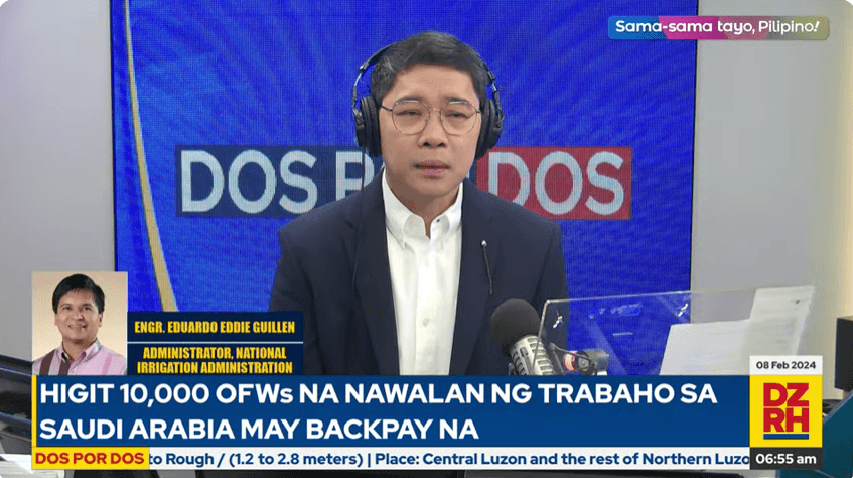

The Philippines will not be exporting products from other countries in the future as the national government is targeting to be "rice self-sufficient" by the year 2028, National Irrigation Administration (NIA) administrator Engr. Eduaro Guillen said on Thursday, February 8.
Interviewed on Dos Por Dos, Guillen said that the goal is possible to achieve in 2028 as we are exporting tons of rice to other countries.
"By 2028, pwede na nating ma-align 'yan. Ang totoo, mahigit 3M metric tons ang ini-import natin. Kung titingnan, madali lang naman sana itong magawaan ng solusyon. Sabi ko, hindi naman ito rocket science, common sense lang ito, simple math at diskarte," the NIA administrator said.
Guillen noted that the NIA already has three ways to attain rice sufficiency in the target year, and one of these is increased yield.
"Ang NIA, mayroong napapatubigan na 1.3 million hectares. Kung titingnan sa data, nasa 4.1 tons tayo per hectare ang average natin. Kung nasa 6 tons ang average yield, halos nasa 5.2 hectares na ang increase sa production sa palay. Sobra na 'yon sa ating kailangan," he said.
"Kapag dry season, umaabot sa 8 tons ang farmers. Yung iba 10 tons or 12 tons. Ang kailangan lamang dito, iparating sa farmers yung higher variety, yung hybrid rice, at assistance sa fertilizers," the NIA administrator added.
To implement the plan, Guillen also said that government aid should reach the farmers at the right time, noting that the government provides a lot of assistance but does not reach them immediately.
"Ang dami natin assistance. Kung maiparating sa mga magsasaka sa tamang oras or bago mag-release ng tubig, nasa kanila na ang farm assistance siguradong ma-attain na nila ito," he noted.
Adding another strategy, Guillen said there should be two plantings in the dry season, which will begin in the month of October and be harvested in the month of February and then replant so that it can be harvested before the wet season arrives.
"Alam naman natin na nagdo-doble lang ang ani kapag dry season kasi kapag wet season, mababa ang yield. Ang gagawin ng NIA, baguhin ang cropping calendar at magsimula ng October. Ngayon, pinag-aaralan sa NIA at may plano na para baguhin ang cropping calendar natin," he explained.
Meanwhile, government assistance for farming technologies must be clearly explained to farmers.
"Ang pagsasaka, isang kultura na mahirap baguhin minsan. Kaya ang mga magsasaka matitigas ang ulo minsan. Kapag may bagong technology, ayaw nila. Alam ko naman ang diskarte diyan. Ipaliwanag lang ng maganda, merong ipakitang magandang ehemplo at ang mga magsasaka ay susunod din," Guillen stressed.
The NIA administrator said he is certain that President Ferdinand 'Bongbong' Marcos Jr.'s promise of P20 per kilo of rice is still possible as long as it is ensured that the supply of rice in the country is sufficient.




